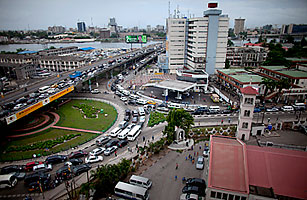
A traffic jam, also known as a go-slow, in Lagos
(2 of 3)
Within a few years, Lagos was one of the world's first failing megacities, a victim of what U.N.-Habitat, the international organization's agency for human settlement, calls overurbanization — a concentration of too many people in too little underdeveloped space. Lagosians tried to adapt. With hours of daily gridlock, businessmen converted their car backseats into offices, complete with phones, laptops and secretaries, while motorbike taxi drivers shaved down their handlebars to stubs, the better to slip through the narrowest of gaps. Offices and factories squeezed into residential apartments. Almost every tree was cut down and every garden built on.
The celebrated Dutch architect and urban-development theorist Rem Koolhaas, who has published several studies of Lagos, eulogizes this chaotic, organic growth and the dynamic adaptability it instills in Lagosians. But the reality of anarchy is often less romantic. As long ago as the 1970s, when the city began to buckle, the federal government abandoned Lagos for a new purpose-built inland capital, Abuja. Foreign investors and tourists stayed clear. As the city crumbled through the 1980s, "area boys," self-proclaimed vigilante street gangs that ran protection rackets and mugging syndicates, began terrorizing neighborhood turfs. By the time Babatunde Fashola was elected governor in 2007, Lagos was a place, he says, "of very evident despair."
The Bottom of the Pyramid
Fashola is not your usual politician. Rather than barging his way across town with sirens blaring and lights flashing like other Nigerian leaders, he chooses to endure Lagos' traffic with his fellow citizens. Also, Fashola reads economic theory for fun. On his bedside table: books by development economists who see potential in poverty, people like the late C.K. Prahalad of the University of Michigan or Hernando de Soto of the Institute for Liberty and Democracy (ILD) in Lima. They argue that the poor may lack money as individuals but together, in their tens of millions, they represent a massive untapped resource.
That counterintuitive approach resonates with Fashola. When he looked at Lagos as its new governor, he says, "in everything I saw, I saw opportunity. The infrastructural deficit of Lagos [is also] a chance to relieve its poverty. If there is a bad road, it means we need an engineer and laborers, architects, valuers, land merchants, banks, merchandisers, suppliers of iron rods and cement, and food courts." So Fashola embarked on a comprehensive overhaul of Lagos' infrastructure, building new expressways, widening and resurfacing others, stringing streetlights along all the main highways, integrating road with rail, air and even water. The city was too big to transform overnight, but improvements were soon marked. Traffic slackened, garbage dumps were replaced with green parks, the proportion of Lagosians with access to clean water rose (from 30% to 59%) and flood defenses covering 10.8 million people were strengthened. Eventually Fashola created tens of thousands of jobs in construction and municipal projects — 42,015 jobs in environmental and waste management alone. New state skills centers trained an additional 250,000 people in new trades, then offered them microloans to set up their own businesses.
Lagos' chronic lack of space presented another paradoxical opportunity. Scarcity of anything increases its value, an economic truth reflected in city-center rents in Lagos that were higher than those in London or Manhattan. Lagos, Fashola realized, was a potential real estate gold mine. That insight led to Eko Atlantic, which, because of the profits to be made, will be entirely privately financed. The same calculation underpins Fashola's new 17,000-hectare Lekki industrial park, being built on marshland northeast of Eko Atlantic.
The most ambitious part of Fashola's plan is still unfolding. In 2004, when he was working as the chief of staff for the previous governor, Fashola set up the annual Lagos Economic Summit. It was there in 2008 that he met a representative from de Soto's ILD. De Soto's work on informal economies — the unregulated and unmapped businesses in which the vast majority of people in the developing world earn a living — makes him a champion of the idea that the poor are an untouched resource. De Soto and the ILD have set up programs in 30 countries designed to correct that, making the informal economy formal so governments can regulate, tax and promote it. "Everything has a potential value you can unlock," he tells Time. "You just have to figure out how to harness the power that's already there."